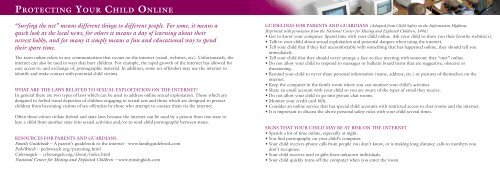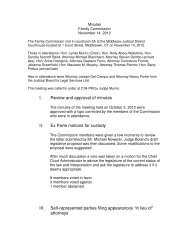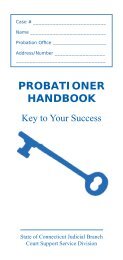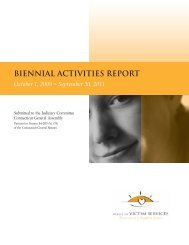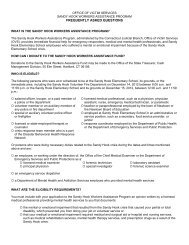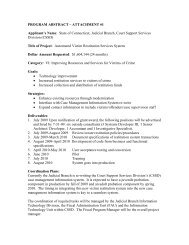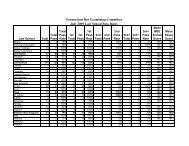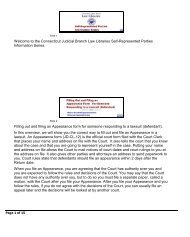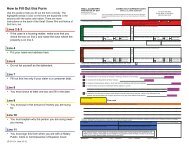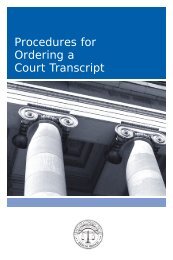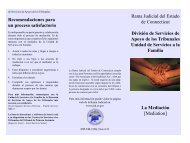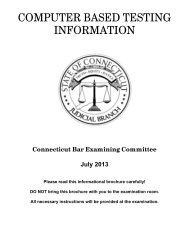Megan's Law paged for pdf - Connecticut Judicial Branch
Megan's Law paged for pdf - Connecticut Judicial Branch
Megan's Law paged for pdf - Connecticut Judicial Branch
You also want an ePaper? Increase the reach of your titles
YUMPU automatically turns print PDFs into web optimized ePapers that Google loves.
PROTECTING YOUR CHILD ONLINE<br />
“Surfing the net” means different things to different people. For some, it means a<br />
quick look at the local news, <strong>for</strong> others it means a day of learning about their<br />
newest hobby, and <strong>for</strong> many it simply means a fun and educational way to spend<br />
their spare time.<br />
The term online refers to any communication that occurs on the internet (email, websites, etc). Un<strong>for</strong>tunately, the<br />
internet can also be used in ways that hurt children. For example, the rapid growth of the internet has allowed <strong>for</strong><br />
easy access to, and exchange of, pornographic material. In addition, some sex offenders may use the internet to<br />
identify and make contact with potential child victims.<br />
WHAT ARE THE LAWS RELATED TO SEXUAL EXPLOITATION ON THE INTERNET?<br />
In general there are two types of laws which can be used to address online sexual exploitation. Those which are<br />
designed to <strong>for</strong>bid visual depiction of children engaging in sexual acts and those which are designed to protect<br />
children from becoming victims of sex offenders by those who attempt to contact them via the internet.<br />
Often these crimes violate federal and state laws because the internet can be used by a person from one state to<br />
lure a child from another state into sexual activities and/or to send child pornography between states.<br />
RESOURCES FOR PARENTS AND GUARDIANS<br />
Family Guidebook -- A parent’s guidebook to the internet - www.familyguidebook.com<br />
PedoWatch -- pedowatch.org/parenting.html<br />
Cyberangels -- cyberangels.org/about/index.html<br />
National Center <strong>for</strong> Missing and Exploited Children -- www.missingkids.com<br />
GUIDELINES FOR PARENTS AND GUARDIANS (Adapted from Child Safety on the In<strong>for</strong>mation Highway.<br />
Reprinted with permission from the National Center <strong>for</strong> Missing and Exploited Children, 1994.)<br />
• Get to know your computer. Spend time with your child online. Ask your child to show you their favorite website(s).<br />
• Talk to your child about sexual exploitation and potential dangers when using the internet.<br />
• Tell your child that if they feel uncom<strong>for</strong>table with something that has happened online, they should tell you<br />
immediately.<br />
• Tell your child that they should never arrange a face-to-face meeting with someone they “met” online.<br />
• Do not allow your child to respond to messages or bulletin board items that are suggestive, obscene or<br />
threatening.<br />
• Remind your child to never share personal in<strong>for</strong>mation (name, address, etc.) or pictures of themselves on the<br />
internet.<br />
• Keep the computer in the family room where you can monitor your child’s activities.<br />
• Share an email account with your child so you are aware of the types of email they receive.<br />
• Do not allow your child to go into private chat rooms.<br />
• Monitor your credit card bills.<br />
• Consider an online service that has special child accounts with restricted access to chat rooms and the internet.<br />
• It is important to discuss the above personal safety rules with your child several times.<br />
SIGNS THAT YOUR CHILD MAY BE AT RISK ON THE INTERNET<br />
• Spends a lot of time online, especially at night.<br />
• You find pornography on your child’s computer.<br />
• Your child receives phone calls from people you don’t know, or is making long distance calls to numbers you<br />
don’t recognize.<br />
• Your child receives mail or gifts from unknown individuals.<br />
• Your child quickly turns off the computer when you enter the room.


